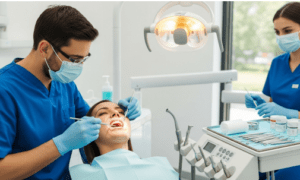Technology has transformed all domains of life around us, and healthcare is also revolutionizing. From changes in stethoscopes over the years to the use of diagnostic machines, including CT-scan and MRI, healthcare has improved multiple folds. The advancements in technology have helped healthcare practitioners provide better services to patients. It has improved accessibility, efficiency, accuracy, and cost-effectiveness and offers a personalized experience.
This article will cover all the various technologies that have transformed the health industry.
Remote Monitoring Devices
Remote monitoring devices have proved helpful in monitoring people with multiple health conditions, such as controlling blood pressure. These remote monitoring devices allow physicians to track the activity and vitals of the patients without keeping them in the hospital for long. The patients can carry out their daily tasks while monitoring their activities with their doctor. The doctor can offer adequate medical advice without the need to meet in person unless the patient’s condition is serious.
Digital Dispensing
The prescription filling has always been a challenge, especially for the elderly. The inability to keep track of the medicines often leads to delayed prescription filling and missed doses. Digital dispensing has solved this problem to some extent by sending notifications when it is time to renew the prescription. It enables patients to take their medication on time without missing doses.
Artificial Intelligence
Experts believe that artificial intelligence might take over the roles of humans. There is no clarity about how much of the world will be handled by AI in the future, yet it is quite a helpful tool in healthcare right now. It is being used in the diagnosis and treatment of diseases and disorders. It has made it possible to move forward from optical and digital microscopes and detect abnormalities better.
Medical Applications
Developers have created applications for the healthcare industry that allow people to learn about illnesses and maintain their health better. Some online applications allow you to enter your symptoms and get a basic understanding of your condition. At the same time, a few others enable getting an appointment with your doctor without going to the clinic. You may also track your calorie intake, heart rate, walking steps, and daily physical activity through these apps.
Big Data
Healthcare faces a huge challenge in data collection and sorting. However, technological advancements have allowed the healthcare industry to analyze data better. Now healthcare professionals can enter their patient’s history and current treatment regimen in the software to avoid asking for the details again. This way, this information can be shared with different doctors within the hospital per need.
3D Printing
While it might have seemed impossible a few years back, now it is possible to 3D print organs such as bones and limbs and attach them to the body. They are produced using highly realistic and suitable materials which do not react to body tissues. It has proved to be helpful in managing anomalies detected before or after birth. Now, doctors can detect abnormalities in the fetus and use 3D printing to facilitate patients at an early age.
Telemedicine
In the fast-moving world, telemedicine has become a need. Instead of relying on the internet for medical advice, you can connect to professionals through a phone. Different healthcare institutes offer this facility in emergency response, pharmaceutical assistance, and general medical issues. Telemedicine also acts as an educational device in providing information to healthcare workers in remote areas.
Accessible Information
Software has made it easy for healthcare professionals to access literature worldwide without carrying books. Many e-libraries and institutional websites allow healthcare workers to access information anywhere. It enables them to make more informed decisions for the patients.
Genome Sequencing
Genome sequencing testing has been made possible by using technology, which can help learn about medical conditions, drug sensitivities, and family history. It is also helpful in understanding nutrition and genomics to provide better solutions to hereditary issues. Many companies are using genetic coding to prepare products for their target customers.
The Bottom Line
Technology plays a pivotal role in all domains of life, as you must have seen alterations in the types of stethoscopes to utilize telemedicine for the cure. Technology has enabled healthcare professionals to access literature easily and maintain the records of their patients for better treatment. The use of software and the internet to provide telemedicine counseling and diagnosis of diseases through medical applications has eased the healthcare dynamics. In the future, AI and VR are believed to contribute to better medical facilities for patients at a lesser cost.



































